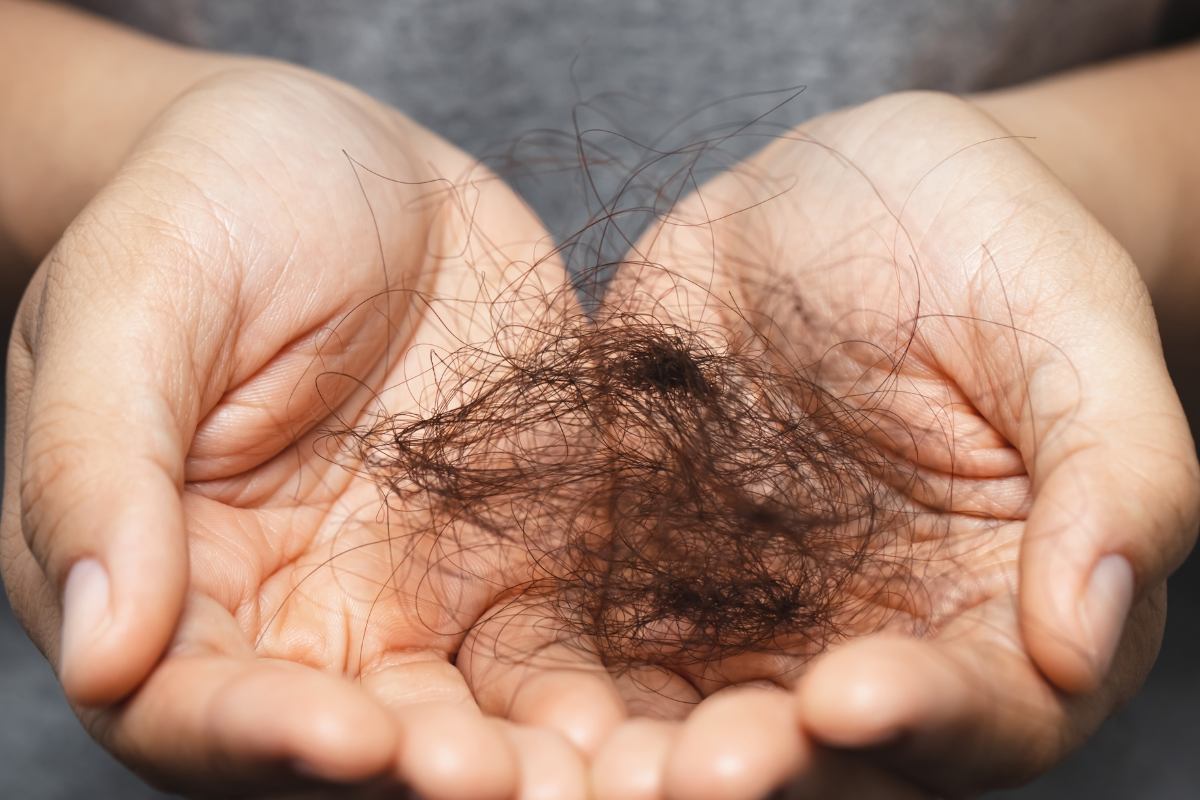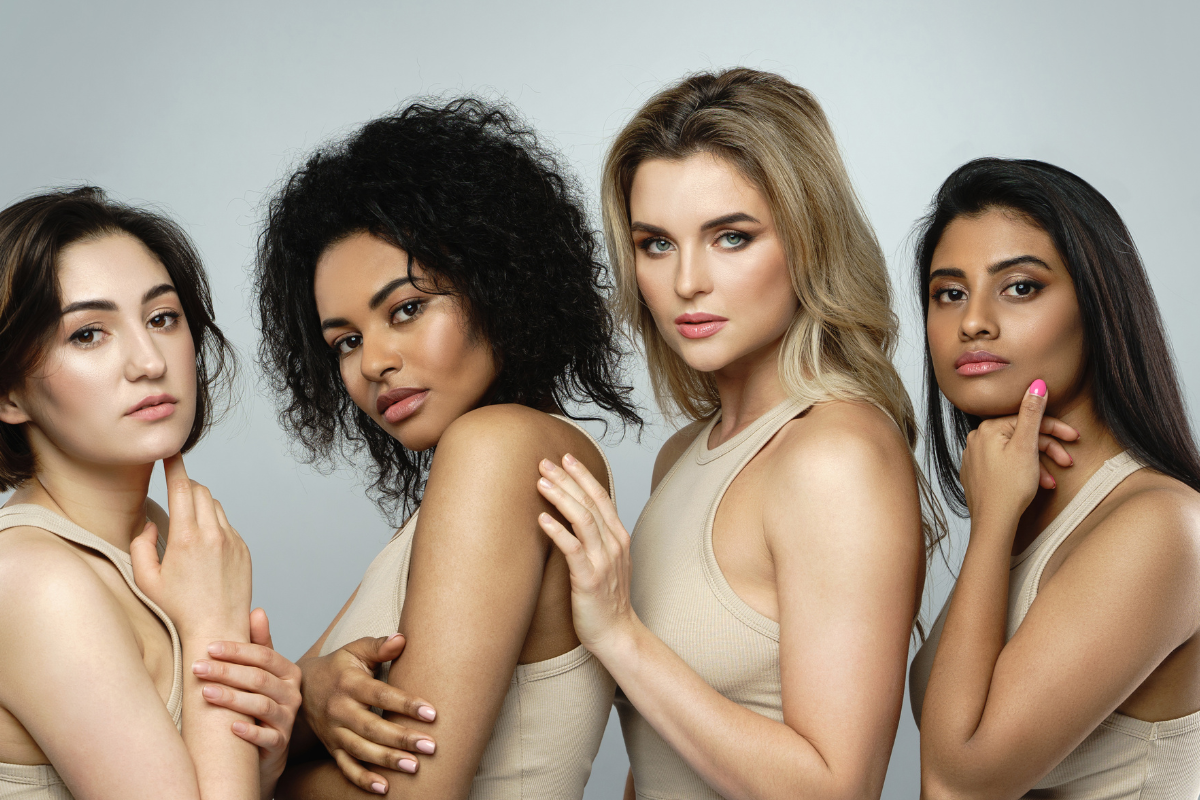Hair loss and menopause

Hair loss and menopause
As estrogen and progesterone levels drop, hair grows more slowly and becomes much thinner. A decrease in these hormones also triggers an increase in the production of androgens, or a group of male hormones. Androgens shrink the hair follicles, resulting in hair loss on the head.
Why does one lose more hair in menopause?
Menopausal hair loss can be caused by stress, illness or nutritional deficiencies, but the most common cause is hormonal changes.
Menopause is a natural biological process that all women experience at some point in their lives. During this time, the body goes through many physical changes as it adapts to fluctuating hormone levels. Many women experience unpleasant symptoms during menopause, including hot flashes, mood swings and insomnia. Hair loss is another common occurrence.
Hair loss tends to be more subtle in women than in men. Most women experience overall hair thinning rather than noticeable bald patches. Hair loss can occur on the front, sides or top of the head. The hair can also fall out in large clumps during brushing and showering.
Research suggests that hair loss during menopause is the result of a hormonal imbalance. Specifically, it is related to a lowered production of estrogen and progesterone. These hormones help the hair grow faster and stay on the head for longer periods. When estrogen and progesterone levels drop, hair grows more slowly and becomes much thinner. A decrease in these hormones also triggers an increase in the production of androgens, which are a group of male hormones. Androgens shrink the hair follicles, resulting in hair loss on the head. In some cases, however, these hormones can cause more hair to grow on the face. This is why some menopausal women experience increased facial hair and more hair on the chin.
For women going through menopause, the cause of hair loss is almost always related to hormonal changes. However, there are many other factors that can contribute to hair loss during menopause. These include extremely high levels of stress, illness or lack of certain nutrients. Diagnostic blood tests that can help rule out other causes of hair loss include, for example, thyroid tests that look at thyroid hormones. The thyroid hormones are called thyroxine and triiodothyronine. They affect almost all body functions. The most important function is to regulate metabolism, i.e. how the body converts nutrition into energy. Thyroxine is called T4 and triiodothyronine is called T3. The production of thyroxine and triiodothyronine is controlled by another hormone called thyroid-stimulating hormone. It is formed in the pituitary gland in the brain. Thyroid stimulating hormone is abbreviated to TSH. The thyroid gland's production of hormone can be affected in menopause.
What are the best supplements for hair loss and thinning hair?
What can be done to prevent hair loss during menopause?
Hair loss is not a positive experience, but the condition is not permanent. There are various things you can do to treat hair loss and improve the quality of your hair. Follow these tips to keep your hair strong and healthy during menopause.
Reduce stress
It is important to keep your stress levels in check to prevent a hormonal imbalance. Decreased estrogen production can affect your brain chemistry and cause mood swings, anxiety and depression. Practicing yoga and other relaxation methods are extremely effective in combating menopause symptoms. Exercising regularly can also help reduce stress.
Be active and move
Exercise is a key component of a healthy lifestyle. You will feel stronger and happier when you incorporate exercise into your daily routine. It also helps prevent some of the other symptoms of menopause, including mood swings, weight gain, and insomnia. All these factors are important to maintain the hormonal balance, which promotes healthy hair growth, which results in strong and healthy hair.
Choose a form of exercise that works for you. You might want to consider going for a walk, going to the gym, or going for a run.
Eat healthy food and supplement with food supplements for hair
Eating a balanced diet with good fats and plenty of protein is your best defense against hair loss. Make sure you include an adequate amount of whole grains, fruits and vegetables in each meal. It is also important to incorporate monounsaturated oils/fats into your diet, found in olive oil, fatty fish, avocados and nuts. Taking extra hair vitamins such as a dietary supplement with folic acid and vitamin B12 , a dietary supplement with biotin and a dietary supplement with vitamin D can also help restore hair growth. The minerals zinc and iron are also important dietary supplements for the hair . If you want to support your hair a little extra, a dietary supplement with keratin or a dietary supplement with collagen and silicon can contribute to stronger and healthier hair.
Essential fatty acids (essential fatty acids, which the body cannot produce itself) also play a crucial role in maintaining the quality of the hair. These fatty acids are found, among other things, in the following foods:
- Salmon
- Tuna
- Linseed oil
- Walnuts
- Sweet almond
Drink plenty of water
Your body needs to get enough fluids to function properly. Recharge with water throughout the day and drink less juice, soda and other flavored drinks that contain more sugar and carbohydrates than your body needs. The amount of water needed varies from person to person and depends on various factors, including general health and exercise intensity. However, you should not drink all the time. It is possible to drink too much water. If this happens, you may suffer from water poisoning. This means that the body gets too low levels of sodium in the blood. Symptoms of water poisoning can include headache, nausea and dizziness.
Give your hair a rest from hair styling
To prevent dry and brittle hair, it is best to stay away from heat tools, such as hair dryers and flat irons. Hair extensions and other styling methods can also weaken your hair and cause premature hair loss. If you must dye your hair, choose a completely natural hair color. Artificial chemicals found in hair dye can endanger your scalp and hair health. When you wash your hair, always use a nourishing conditioner to keep your scalp healthy and promote healthy hair growth.
If you swim, be sure to wear a swim cap, as chlorine can contribute to hair breakage and breakage. When you're out in the sun or in the wind for long periods of time, it's important to wear a hat to protect your hair from drying out and falling off.
Talk to your doctor if you are taking medications
Some medications have side effects that include hair loss. Talk to your doctor if you are experiencing significant hair loss and you think your medication may be the cause. Your doctor may be able to switch it to a different type of drug without any reported side effects. Do not stop taking your medications until you have spoken to your doctor, as this may be dangerous to your health.
Do a blood test at BLODKOLLEN
Thanks to a genuine collaboration with Blodkollen , we are able to offer professional blood analyzes for hair loss . Blodkollen works with several of the country's leading laboratories. The analyzes are of the same quality as at your doctor, and are carried out by authorized laboratories around the country.
Are you losing hair or feel that your hair has become much thinner? Then you should start by checking for possible nutritional deficiencies or hormonal imbalances via a blood test.
- Tags: Hår/Hair Kollagen/Collagen





